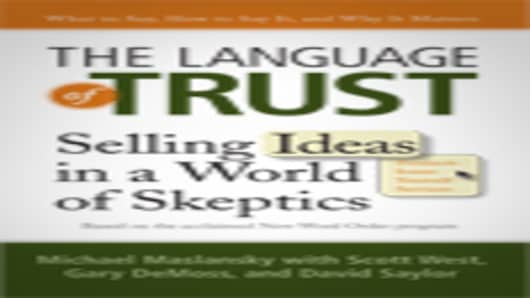CNBC Guest Author Blog: GM’s Missed Opportunity: Why stretching the truth was a bad idea by Michael Maslansky author of "The Language of Trust: Selling Ideas in a World of Skeptics."
If I had learned that GM had repaid its $6 billion in TARP loans, I would have thought it was a positive development.
If I had learned that the repayment was five years ahead of schedule, I would have thought GM was starting to make the right moves.
Even if I knew that GM still had a long way to go, even $52 billion to go, I would have said, hey, this is progress.
I think America would have felt the same way.
Sadly, GM didn’t think this progress was good enough. So they stretched the truth and tried to turn a small step into a major leap. They tried to make repayment of $6 billion sound like complete repayment of almost $60 billion.
And in the process they managed to snatch defeat from the jaws of PR victory.
There is no doubt that GM could argue that many people will see the positive advertisements from GM and not the negative commentary from the press and pundits and will have a more positive opinion of GM. GM could also argue that if you parse their language, they did tell the whole story.
Both of these defenses would be missing the point. GM’s announcement fails from a communications standpoint on a number of fronts.
1. What matters is the public’s view of the truth, not GM’s.
GM approached this announcement from their internal perspective. They saw this as a big opportunity and they had a full-blown rationale for why. Let’s call it “GM’s Truth” and it went something like this: we repaid our loans. We worked really hard to do it. Our efforts should be celebrated. The American public will appreciate learning about our efforts. Telling them will help us to rebuild our reputation.
Then the announcement had to get through GM’s legal department, which means that there were undoubtedly a gaggle of lawyers who parsed every word and phrase to make sure that it was legally correct. It is. There are no lies in GM’s statements. There aren’t even any half-truths. GM says it repaid the “government loans” and that is, in fact, what it repaid.
Chances are that GM’s PR team supported the idea, as did others inside the organization. I see this all the time. Bad ideas sound like good ideas because corporations are often echo chambers filled with people who are willing to give an idea the benefit of the doubt. In that environment, it is much easier to sell an idea than it is in the real world. And so the company moves forward.
Unfortunately, the public has a completely different view of the truth than GM. Saying the ad is factually accurate misses the point. In the public’s mind, GM received much more than the $6 billion in loans. And in the public’s mind, there is no difference between a loan and an equity investment if it is coming from the taxpayers and going to the car company. When it comes to rebuilding a reputation and rebuilding trust, only one side’s truth matters…and it isn’t GM.
2. In a world of skeptics, every fact is questioned.
I find it hard to believe that GM didn’t realize that they were parsing the truth in making these claims. I find it much harder to believe they thought they could get away with such a high-profile exaggeration so easily disproven. We live in a world of skeptics, where the American public (much less the press) doesn’t take a company’s word for anything. We question everything, especially claims by companies trying to change our perception of them. We were certainly going to question this.
Even if GM were a more trusted brand, this kind of announcement would have drawn scrutiny. Even if the issue were less controversial than one of the most controversial government actions taken in decades, critics probably would have picked up on this. But for a company like GM that has few friends and plenty of critics, it was entirely predictable that a range of critics sees opportunity in GM’s exaggeration.
3. This could have been a victory.
What is most unfortunate is that GM failed to see that the repayment of this loan gave it a great opportunity that didn’t need exaggeration. The skeptical American public is, ultimately, highly pragmatic. We are victims of our experiences of being overpromised and underdelivered. Of being baited and switched. Of finding we get what we pay for. For companies, this can be an asset, because it means that we don’t expect companies to be perfect. And we almost always reward the guy who gets up off the ground and asks for redemption.
That is why, with a few simple changes to its message, GM could have created a credible and compelling message: one of responsibility, progress and commitment.
This is the frame that GM should have embraced – one that acknowledges the public’s skepticism while at the same time speaks to what matters to them. GM could have said: “We have a responsibility to pay you back – and we’re working hard every day to do it. Today, we paid back the first $6 billion, with interest and ahead of schedule. Tomorrow, we will continue to do the things we must to build value in our company to ensure that you, the taxpayer, get the rest back as well.”
It might not be as sexy, but it would have been much more credible. And instead of talking about what GM didn’t do, the conversation today would be about what GM did accomplish. At a moment when GM needs every ounce of the public trust, this is one messaging campaign that deserves a recall.
_________________________





